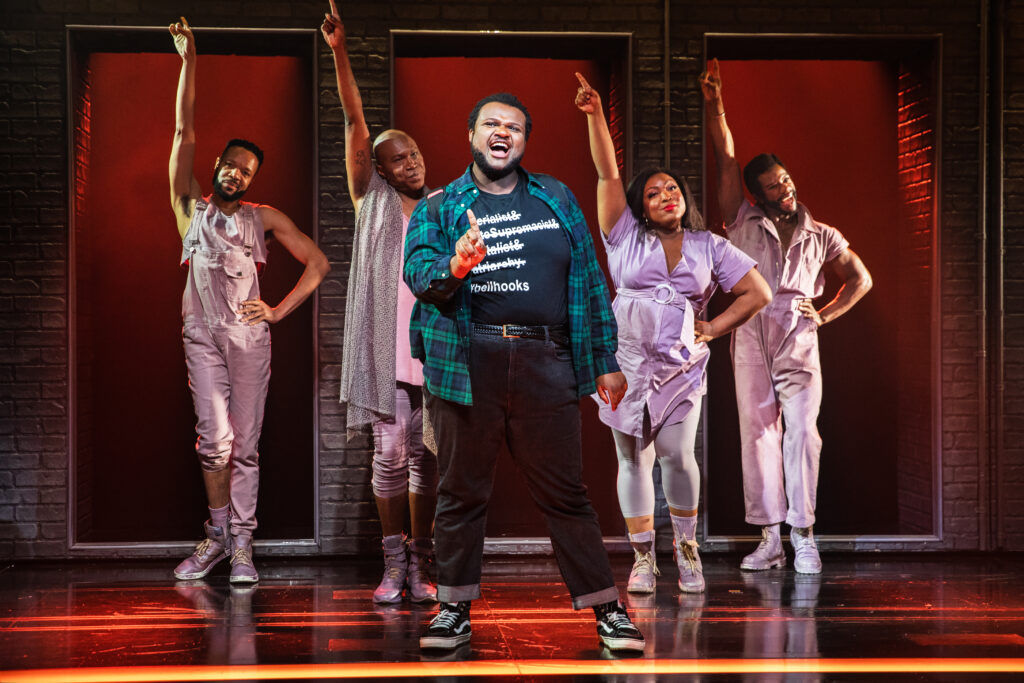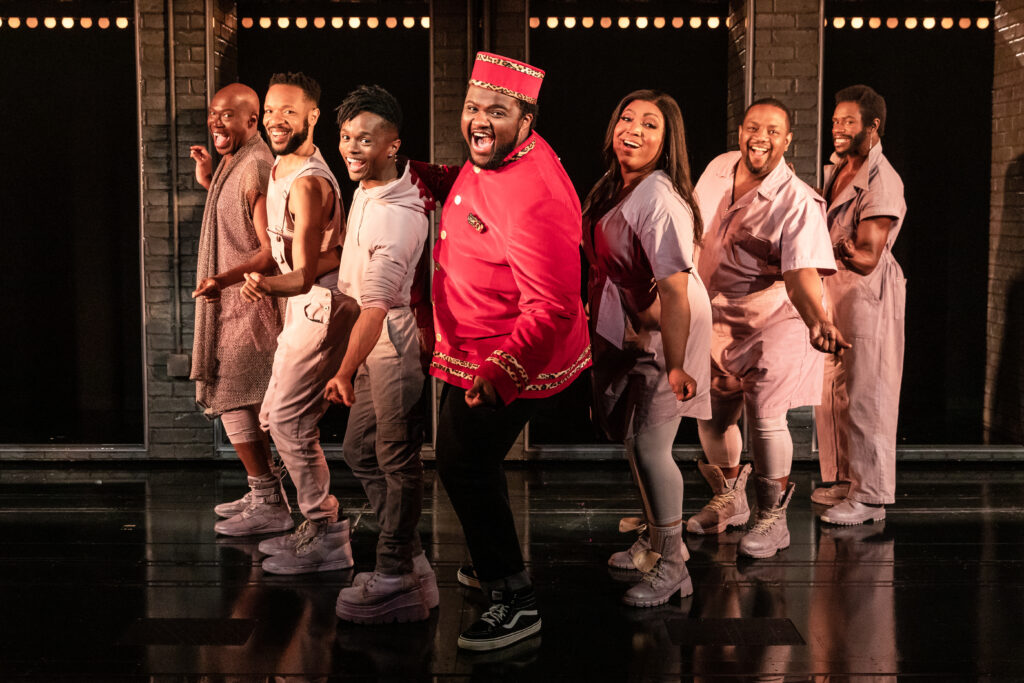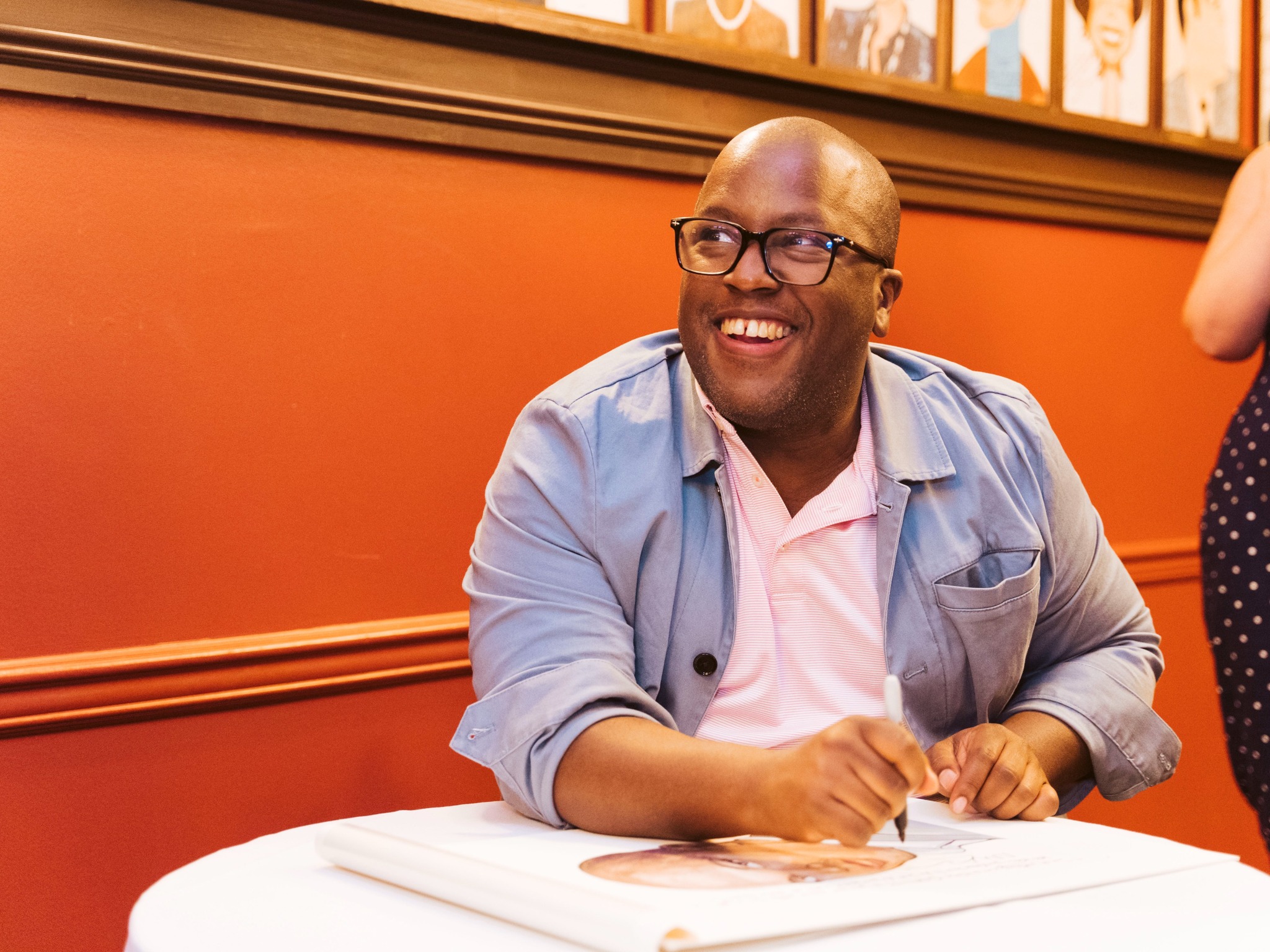In 2020, the gay, Black composer and lyricist Michael R. Jackson won the Pulitzer Prize for Drama for his musical, “A Strange Loop.” Jackson’s achievement was incredible on multiple levels: He was the first Black musical-theater writer ever to win the award, he had been working on the show for 20 years and “Loop” won the Pulitzer without having gone to Broadway first. (It debuted off-Broadway at Playwrights Horizon.)
The musical, which premiered on Broadway this spring and was nominated for 11 Tonys (including two for Jackson himself), is an enormously inventive, funny and challenging show. “Loop” tells the story of a young, gay, Black composer named Usher stuck working as an actual usher at “The Lion King” while he tries to write a musical about his struggles to find a space for himself in the Black community, whose Tyler Perry-flavored Christianity can at times be hateful toward LGBT people and whose gay subculture can sometimes be vain, narcissistic and self-hating.
In addition to Usher, there are six other characters, each of them representing a voice in his head, who mostly condemn him and sometimes play the roles of his family. His mother continually says he is going to get AIDS and go to hell and his father presses him in uncomfortable ways about his attractions. But still, Jackson very pointedly highlights their deep love for Usher.
Ahead of the 75th Tony Awards this Sunday, I spoke to Jackson via Zoom about his own experience growing up gay in a Christian community, his understanding of faith and the human struggle to break free of the loops we let play in our heads.
The following interview has been edited for length and clarity.
Jim McDermott, S.J.: I can’t thank you enough for “A Strange Loop.” I’ve seen it a number of times now and, as a gay man, it’s been very gratifying. I feel like each time I’ve gone it’s taken me to a deeper place.
Michael R. Jackson: Well, thank you for coming more than once.
“A Strange Loop,” which premiered on Broadway this spring and was nominated for 11 Tonys (including two for Jackson himself), is an enormously inventive, funny and challenging show.
What was your own experience of religion growing up?
I grew up in a Baptist church from, like, birth until I was 18 years old. My family on my dad’s side was very involved in the institutional church. My grandfather was a trustee. My great-uncle was a deacon. My dad was a church officer; my mother was a church officer and church secretary. My grandmother was a Sunday school teacher and sort of a mother of the church.
I played piano for two of the choirs from 12 years old until, like, 18. When I was younger, I went to church many times a week—to Bible studies and church services. Also, in the summer, we’d do vacation Bible school and all that—the whole megillah.
My mom still goes to the church that I went to as a kid and a lot of the people are still there. They were very much a part of the village that helped raise me, in a way.
What was that like for you as a gay person?
It was complicated. Because, on the one hand, I love those folks a lot, but on the other hand, especially once I got to be a teenager and was starting to realize I was gay, it was difficult because they were often anti-gay messages that were taught in Sunday school and from the pulpit. It was everywhere and that was hard.
But also on top of that—and this is where I credit Tori Amos with some of my education, because she sings so much about her religious upbringing—I started to question some of the Bible, even outside of the anti-gay stuff that was in the church. I started to really think about how, oh, I’m in a religion that is asking me to “crucify the flesh.” (cf. Gal 5:14; Mt 10:39) What’s that about? Why do I need to do that?
And why is there so much emphasis on sexuality as sinful, and on original sin and curiosity as this thing that the Old Testament forbids? “You shall not eat of the fruit. …” (Gn 3:3) What does that mean?
All these metaphors tie back to sensuality, sexuality and the body, but then the body is crucified to purge us of our sins. I just started to question it. And I still do.
But being in the theater, getting to tell stories and being with people there, that’s become a new kind of church for me.
Do you think the experience of transcendence you felt in church from led you to theater?
I mean, the theater was in the church. There was so much about being in church that was like being in a play. My friend and I talk about this all the time; I don’t know what white churches are like, but in black churches you’re often interacting with the people like you’re in a play, a play of life.
In “Loop,” there’s that extraordinary Tyler Perry sequence where you suddenly turn the audience into a church congregation where these awful homophobic things are being said. You can hear people gasp when that happens.

You’re seeing everything from Usher’s perspective and when you get to that point, he really wants to show you what that feels like for him, and so you in the audience have to participate. For Usher, the music is really beautiful and banging, but the message is really painful, and you’re clapping along. That’s the contradiction of what it feels like to be a Black gay man from his background and his perspective.
Would you say that the way your church talked about homosexuality made it hard to come out or to accept yourself?
I think I accepted myself, and there’s an asterisk to that, but it definitely made it harder. I certainly did not want to come out and I came out to my parents not really by choice. It was difficult. I knew what the culture was around me, and I knew it would not be received well.
“Being in the theater, getting to tell stories and being with people there, that’s become a new kind of church for me.”
Michael r. jackson
Did that difficulty last a long time?
Yeah. It’s complicated because my family’s love for me was never in question. Never, not even once. But it did, I think, put a kind of distance between us. I definitely kept a wall up after that initial coming out, to protect myself. Because everyone had such strong emotions about it that I just didn’t know how to handle it, and there was nobody in my immediate family to take care of my emotional needs in that moment. And so I had to do it myself.
One of the things that hit me again and again watching “Loop” is the fact that even as they say horrible things, Usher’s family clearly loves him. I wanted so much to scapegoat Usher’s parents for the way they treat him, but you make that impossible
And many people just do it anyway. They cannot hold space for complexity at all.
It’s interesting. It’s clear that both their prejudice and their love emerge from their faith. Do you feel like love and hate are somehow inextricable in a lot of religious practice?
People always say that hate comes from a place of fear. And I think his parents are coming from a place of fear. So you have, “I love you, but I’m afraid for you because I’m afraid this or that is going to happen, whether in this life or the next one.” That’s a filter over everything. Because they might sincerely feel that if you are gay, you will get H.I.V., which will then become AIDS and kill you just like it killed your cousin. And then after that, then you will go to hell and you will burn for eternity. And I don’t want that because I love you, and Jesus loves you, and you have a choice about not getting H.I.V./AIDS and not going to hell by going against God’s word.
It’s very simple. The ideology is so intact that when you have that filter or that loop in yourself, nothing will break it until you break it or until your perception shifts.
That proves to be the journey of Usher as well.
It’s the journey of everyone. You hear these stories all the time of families that were not accepting and then one day they were. There was a perception shift at some point that came either from dialogues they would have with their queer relatives, or they realize over time that they didn’t want to be separated from them—whatever. But there’s a perception shift and suddenly all those years where you were being very homophobic and hateful or whatever, it shifts.
I just think everybody has that capability inside of them.
Near the end of the show, we get this beautiful number, “The Memory Song,” in which Usher looks back on the different parts of his life and embraces the choices he made, including the choice to leave his faith behind so as to survive. And it feels very much like the ending of the show, but there’s still another song which ends up being the real key to the whole show.
It made me wonder whether there is a way in which we, too, can stop at the moment of self-acceptance, thinking that was the point of our struggles, and miss that next and essential moment of self-assessment and awareness.
The shift that happens in Usher is a really small one, but it’s a small one with major consequences. He sees that his thoughts are not necessarily reality.

In my work as a priest, I do what is called “spiritual direction,” where people come and talk about their relationships with God and how they find hope and invitation in their lives. For me a big part of that work is often about helping people to pay attention to the different voices in their heads and befriend them. But watching “A Strange Loop,” I wondered about my approach. It highlighted how some thoughts are truly self-loathing, which is not there to help us.
The thing about a lot of negative self-talk, maybe even all of it, is that it gets put into you, and then you do the rest of the work to perpetuate it. Or it’s constantly being reinforced.
For example, Usher has this idea inside of him, and it’s certainly something that I’ve struggled with, of feeling undesirable, like sexually undesirable to other men. Depending on who you are or what shape you are, that is a situation where tons of input are delivering that message to you. But it’s also true that once that input gets to you, you can magnify it a zillion percent, and never ever see beyond it. And I think that happens in all kinds of negative things that come in.
In regards to homophobia in my family or in Usher’s family, it can become even more magnified in my mind than it is in real life. One thing that can be helpful is to get to a place where you can actually see other people as like human beings, and not just as an object that is there to torture you or to be an obstacle in your path to happiness.
When you say “see them as human beings,” what does that mean?
My mother had a major health event 13 or so years ago. And when that happened, even though we had been in a kind of difficult space, and still were, I suddenly saw her as more of a human being than I ever had in my life. And it shifted for me, or it began to shift for me, how I viewed her, and the way that I felt that she had treated me in terms of my sexuality.
I do not know my mother’s current beliefs about homosexuality and I actually don’t care. But what I can tell you unequivocally is that she loves me, she’s proud of me and she believes in what I’m doing. And that’s really all that matters. She would do anything for me, she would lay down her life for me. And I would do the same for her.
The same thing with my dad: he loves me unequivocally, and I would lay down my life for him and he would do the same.
So do you find part of the journey is getting to a point where the opinions of other people don’t matter?
Yes, I think that the opinions of other people don’t matter. But also, your opinion of yourself has to matter more.
I’m listening to our conversation and feeling like it’d be nice if we heard some of this at the church.
It would be nice.
If you were giving advice to pastors, what do you wish you had heard as a kid, or what do you wish kids were hearing today?
That you don’t have to crucify the flesh. You can be born again without crucifying the flesh. I think that part of the church is so much about shaming and controlling people, and I wish that it wasn’t, that it was actually more about trying to help people find spiritual transcendence and marry their spirituality with their sexuality. These two things do not need to be so separate.
I really admire your ability to refuse the either/ors that a lot of us rely on and admit complexity into your life.
I’m also speaking a little bit from wishful thinking! I’m not saying I have these things in my life. [Laughs] I just I know what I would like to have. I don’t have a partner and I would like one. But I would like that partner to be able to bring the spirituality and the sexuality together. But as a gay man in a very narcissistic, youth-obsessed, body-obsessed culture, I’m like, good luck, Michael. But that’s still what would be the most ideal scenario for me.
Do you have images of God that speak to you?
It doesn’t look like a man or a human. It’s like a spiritual consciousness. I think it’s like our inner selves; all of us have God inside of us, an ability to dream vast worlds and possibilities. I don’t know what that looks like but I think it’s inside of all of us, and to me that’s what I imagine God is like.
If we’re made in his image, his image is one that can create a whole world. All of that comes out of a dream consciousness. It’s why as a writer I often feel like a god, in a sense, because I can create all possibilities on the page. God does that every day.
If you were talking to Black, gay, Christian youths or their families, what advice would you give them?
I would encourage them to really look at each other as humans, and not just as objects that need to conform to any sort of standard. And to be kind to one another, to be compassionate to one another.
Compassion is another word that came up for me watching “Loop.” As a writer you show a tremendous amount of compassion toward everyone. Really. I don’t know where that comes from in you, but it’s a special gift to have empathy, even for the “villains.”
Well, it comes from real life. [Laughs] That’s where it comes from.
Meaning what?
Meaning, I went through so many situations where it was me, you know? Yes, others were not great or whatever, but it took two to tango. You can’t move forward until you account for yourself. If you’re just going through life blaming everyone else and everything else for all the problems, you will never get anywhere. Because there will always be one other thing or person or system. What are you doing, the whole time? These things exist, but so do you.
That’s the way out of our strange loop?
It’s a way. The strange loop never ends, but your perception can change within it. You’re always going to be perceiving reality but you have control over how you perceive it. But you have to be willing to check in with yourself, look in the mirror and say, “Am I perceiving this correctly? Do I need more information? Do I know everything? Or am I just going off on like a loop of certainty, self-pity, self-righteousness or self-delusion?” It’s all just reinforcing itself.




